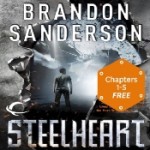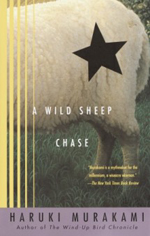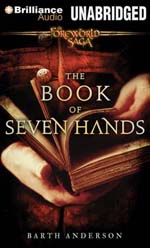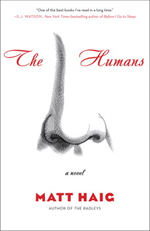
Steelheart
By Brandon Sanderson; Read by Macleod Andrews
[EXCERPT] – 1 hour 31 minutes
Publisher: Audible Frontiers
Published: 2013
Themes: dystopia / superheroes / revenge
Audible has made available the first five chapters of Brandon Sanderson’s forthcoming YA dystopian novel Steelheart for free. The novel will be released September 24.
A red star-like object called Calamity appears in our night’s sky. A year later, certain individuals begin developing supernatural powers and come to be known as Epics. A decade or so later, chaos reigns as the Epics turn our world into their personal playground–and battleground. The novel’s prologue flashes back ten years from the main events to a time when the world was still relatively whole. In an unsettling scene, the titular villain is introduced and grounds for a vendetta are established. The remainder of the excerpt follows the main character, whose name we don’t learn, along his first steps on the path of revenge as he courts the resistance movement known as the Reckoners.
Like many readers, I first heard the name Brandon Sanderson in connection with the Wheel of Time series. Having abandoned that bloated series long ago, I never read his contribution, but I did read and enjoy Elantris, the Mistborn trilogy, and Warbreaker. A few chapters into his gargantuan The Way of Kings, however, I realized I was experiencing Sanderson fatigue. Each of his books or series is best known for its wildly inventive magical system, but I felt like I was reading the same two or three character types with the same motivations battling the same circumstances over and over again.
Judging from the opening chapters, Steelheart shows all the signature strengths of the young writer while shedding the overwrought plotting and characters that plague some of his other work. The novel’s categorization as a YA novel, I think, accounts for a lot of the tight focus on action. The near future dystopian setting also shatters Sanderson’s fantasy mold–The Alloy of Law only cracked it. Of course, the world still bears Sanderson’s unmistakable imaginative stamp. Macleod Andrews’s lively narration also fits the fast pace of the novel quite well, though he’s also capable of rendering the few human, emotional moments expertly as well.
I’m tempted to comment further on the excerpt, but I don’t want to spoil the experience. At an hour and a half, it really is worth a listen, even if you’re normally not a fan of dystopias or YA fiction.
Posted by Seth Wilson


 A Wild Sheep Chase: A Novel
A Wild Sheep Chase: A Novel Book of Seven Hands (Foreworld SideQuest)
Book of Seven Hands (Foreworld SideQuest)




 The Humans
The Humans
